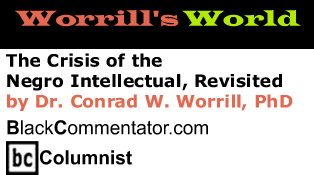
|
|||||||||||||||||||||||
 |
|

Custom Search
|
|
 |
|
One
of our great ancestors, Harold Cruse wrote a book, The
Crisis of the Negro Intellectual which was published in
1967, at the height of the Black Power Movement. This insightful
book stirred up a spirited conversation in the African Liberation
Movement. Brother
Cruse spent most of his activist and organizing days in This
year However When we use the term intellectual we are talking about people who struggle around ideas - writers, poets, scholars, researchers, teachers, students, and activists. Intellectuals are people who grapple with ideas and who function in the cultural, political, educational, and economic domains of the society. As Dr. Anderson Thompson always says, “Ideas are weapons of war.” With this definition, let us review briefly some of the ideas and concepts that Brother Cruse presented in The Crisis of the Negro Intellectual. One of the major points Cruse makes is the African American intellectuals are pathological in their approach to the choices available to them. It is Cruse’s observation that they appear to adopt the values of the dominant group, which he describes as the white Anglo Saxon Protestant. It
was in the first chapter of The
Crisis of the Negro Intellectual that Cruse raised this
question of the problem of identity of the African in
Cruse continued on this point. “I wondered why and very naively expressed my sentiments about it. The replies that I got clearly indicated these amateur actors were not very favorable to the play about Negro life, although they would not plainly say so. Despite the fact that this question of identity was first presented to me within the context of the program of a small, insignificant amateur drama group, its implications ranged far beyond.” Another
problem Cruse addresses is that the African in From
the point of view of Brother Cruse, the African in For
Brother Cruse, the crisis was whether the African in BlackCommentator.com Columnist, Conrad W. Worrill, PhD, is the National Chairman of the National Black United Front (NBUF). Click here to contact Dr. Worrill. |
|
Any BlackCommentator.com article may be re-printed so long as it is re-printed in its entirety and full credit given to the author and www.BlackCommentator.com. If the re-print is on the Internet we additionally request a link back to the original piece on our Website. Your comments are always welcome. eMail re-print notice
If you send us an eMail message we may publish all or part of it, unless you tell us it is not for publication. You may also request that we withhold your name. Thank you very much for your readership. |
|
| |
|
| July
2, 2009 Issue 331 |
|
| Executive Editor: Bill Fletcher, Jr. |
| Managing Editor: Nancy Littlefield |
| Publisher: Peter Gamble |
| Est. April 5, 2002 |
Printer Friendly Version
in resizeable plain
text format or pdf
format. |
| Frequently Asked Questions |
 |

|
 |
 |
 |
| |
| |






























 Cruse
illustrated this in his book when he described the following: “In
1940, as one of my first acts in the pursuit of becoming a more
social being, I joined a YMCA amateur drama group in
Cruse
illustrated this in his book when he described the following: “In
1940, as one of my first acts in the pursuit of becoming a more
social being, I joined a YMCA amateur drama group in 






